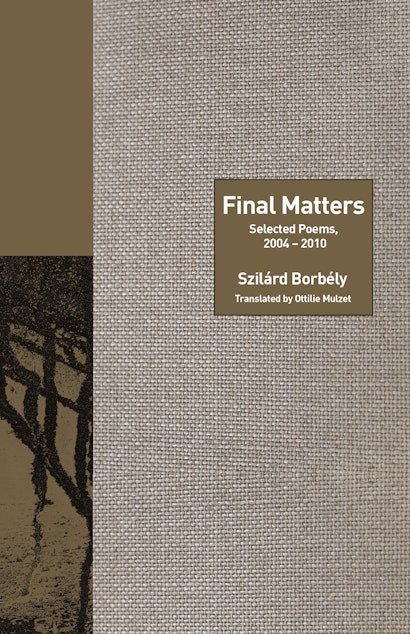Szilárd Borbély, one of the most celebrated writers to emerge from post-Communist Hungary, received numerous literary awards in his native country. In this volume, acclaimed translator Ottilie Mulzet reveals the full range and force of Borbély’s verse by bringing together generous selections from his last two books, Final Matters and To the Body. The original Hungarian text is set on pages facing the English translations, and the book also features an afterword by Mulzet that places the poems in literary, historical, and biographical context. A glimpse inside:
Végső Dolgok
A Halál
Nem volt semmi, ami több lett volna,
mint az elmúlt napok hordaléka,
mit a szél gyűjtött az udvar szögletébe,
mígnem kijött a Fány néni, és elsöpörte,
és beszólt még a földszinti lakásba,
hogy „jó reggelt!”, és „mi lesz ma ebédre?”
Aztán a nap sütött. Galambok szálltak
a házereszre. S látszott a beton minden rücske,
külön-külön és mindörökre. Tavasz volt.
A spaletták behajtva, a redőnyök leeresztve.
S az ablak, hogy résre nyitva volt, az különös,
de mégse annyira. Aztán mindenki kereste
okát a furcsa szagnak. Így lett megint este
és reggel. Harmadik nap. De a földszinti
lakókat, idős házaspár, senki sem kereste.
A nyomozók unottak. Őket nem érinti
meg semmi már. Részegen érkeztek, és a
szomszéd büfében rátöltöttek. A hullákat
Húsvét miatt gyorsan eltemették. Az ügyet
ad acta tették. És nem kapcsolták be a Dies iraet.
Final Matters: Death
There was nothing more than there should have been,
the common residue of the last few days,
gathered by the breeze into the courtyard nooks,
until Fanny the charwoman swept them away
and into the ground-floor flat called
“Good morning!” and “What’s for lunch today?”
The sun shone down. Doves alighted on the eaves
and pockmarks on the cement were seen
each one by itself, for eternity. It was Spring.
The shutters were folded, the shades drawn.
The window opened just a crack, which was strange,
but maybe not so much. And then everyone
was seeking the cause of the peculiar smell. Evening
came, and morning again. The third day. No one
thought of the elderly couple in the ground-floor flat.
The detectives were bored. Nothing affects them
anymore. They were drunk when they got there and
guzzled even more at the drink-stand next door. The corpses
were buried quickly, because it was Easter. The case
was closed. And no one played the Dies irae.
Szilárd Borbély (1963–2014) wrote in a wide variety of genres. His books include the novel The Dispossessed and the poetry collection Berlin-Hamlet. Ottilie Mulzet is a literary critic and the translator of The Dispossessed and Berlin-Hamlet, among other books. Her translation of the novel Seiobo There Below by László Krasznahorkai won the 2014 Best Translated Book Award. She lives in Prague.

